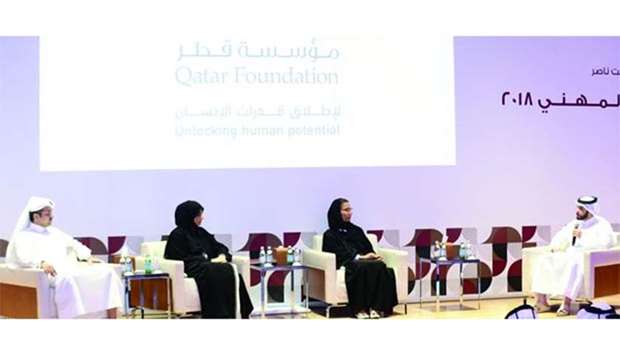More than 250 policy-makers, decision-makers and senior executives from various government institutions from Qatar and international organisations from the rest of the world took part in the second edition of Career Guidance Stakeholders Platform yesterday at the Qatar National Convention Centre.
The event, organised in partnership with the Unesco Doha Office and the Ministry of Education and Higher Education, comes within the framework of Qatar Career Development Centre’s (QCDC) commitment to delivering on the priorities stipulated by His Highness the Emir Sheikh Tamim bin Hamad al-Thani in his address to citizens and residents of Qatar in July 2017. He stressed the importance of investing in the development of national human capital.
The event, under the patronage of Her Highness Sheikha Moza bint Nasser, Chairperson of Qatar Foundation (QF) and organised by QCDC, a member of QF, was attended by HE the Minister of Culture and Sports Salah bin Ghanem bin Nasser al-Ali, HE the Minister of Administrative Development, Labour And Social Affairs Dr Issa Saad al-Jafali al-Nuaimi and HE the Minister of Education and Higher Education Dr Mohamed Abdul Wahed Ali al-Hammadi and other senior QF officials.
Themed ‘Moving Operationally to Strategically Enhance Career Guidance in the State of Qatar’, Career Guidance Stakeholders Platform 2018 is in line with QF’s efforts to promote career guidance in Qatar.
“Nation-building requires a diverse set of competencies, skills, and jobs to ensure self-sufficiency when it comes to the local labour force required to bolster the state’s economy at present and in the future,” QCDC director Abdulla al-Mansoori told participants yesterday, including representatives from Unesco and various ministries in Qatar.
He added that QCDC is collaborating with the Ministry of Education and Higher Education, Unesco and public and private institutions to create a framework for the development of standards and policies for career guidance at the national level.
The Centre also wants to identify the roles and responsibilities of stakeholders in the implementation of this strategy inspired by the Qatar Education and Training Strategy 2017-2022.
“This event highlights the importance of integrating technology-based career guidance services and resources and applying Unesco’s technical and vocational education and training (TVET) standards,” al-Mansoori added.
Representatives from educational institutions such as QF, Qatar University (QU), Community College of Qatar, College of the North Atlantic – Qatar, and national talent development committees in institutions like Hamad Medical Corporation, Qatar Petroleum, Sidra Medicine, and Qatar Airways also participated in the event.
“After this event, we will first seek to agree on a strategy and standardised policies that will identify how different government sectors and agencies could work together in harmony for a common goal. As we move forward, such strategies would serve as catalysts that would speed up the development process,” keynote speaker Dr Raimo Vuorinen, Associate Professor at the Finnish Institute for Educational Research, at the University of Jyvaskyla, Finland and Vice-President of the International Association for Vocational and Educational Guidance, said.
In her speech, Dr Faryal Khan, programme specialist for Education, Unesco Doha Office, stressed that: “Qatar, alongside its partners on the national, regional, and global levels, is a leading country in promoting career guidance in accordance with a well-planned agenda that falls in line with its national strategies and vision.”

The Career Guidance Stakeholders Platform 2018's opening yesterday featured a plenary session, which brought together (from left) Saif al-Kaabi, Fawzia Abdulaziz al-Khater and Professor Sheikha Abdulla al-Misnad. It was moderated by Al Arab managing editor Jaber bin Nasser al-Marri. PICTURE: Shaji Kayamkulam.

